formerly eScholarship Editions


|
|
|
|
Your request for similar items found 20 book(s). | Modify Search | Displaying 1 - 20 of 20 book(s) | |
| 1. | 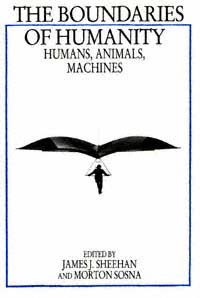 | Title: The Boundaries of humanity: humans, animals, machines Author: Sheehan, James J Published: University of California Press, 1991 Subjects: Philosophy | History and Philosophy of Science | Biology | Technology and Society Publisher's Description: To the age-old debate over what it means to be human, the relatively new fields of sociobiology and artificial intelligence bring new, if not necessarily compatible, insights. What have these two fields in common? Have they affected the way we define humanity? These and other timely questions are addressed with colorful individuality by the authors of The Boundaries of Humanity .Leading researchers in both sociobiology and artificial intelligence combine their reflections with those of philosophers, historians, and social scientists, while the editors explore the historical and contemporary contexts of the debate in their introductions. The implications of their individual arguments, and the often heated controversies generated by biological determinism or by mechanical models of mind, go to the heart of contemporary scientific, philosophical, and humanistic studies. [brief] Similar Items |
| 2. | 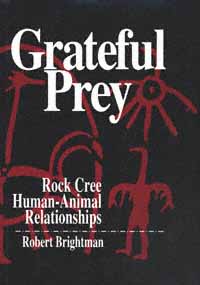 | Title: Grateful prey: Rock Cree human-animal relationships Author: Brightman, Robert Alain 1950- Published: University of California Press, 1993 Subjects: Anthropology | Anthropology | United States History | Religion Publisher's Description: The interaction between religious beliefs and hunting practices among the Asiniskawidiniwak or Rock Crees of northern Manitoba is the focus of Robert Brightman's detailed study. This foraging society, he says, bases aspects of its hunting and trapping largely on what we call "religious" conceptions.Seeking an ideology, however, that incorporates Cree beliefs about human-animal differences and the relationships that should exist between them as hunter and prey, Brightman finds these beliefs to be disordered and unstable rather than systematic. Animals are represented as simultaneously more and less powerful than humans. The hunter-prey relationship is talked about as both collaborative and adversarial. Exploring the influence of these religious representations on technical aspects of subsistence historically, Brightman finds that Crees' attitudes and actions toward animals were, and are, relatively arbitrary with respect to biological and environmental forces. Anthropologists will see in his well-researched discussion a challenge to prevailing ecological and Marxist approaches to foraging societies. [brief] Similar Items |
| 3. | 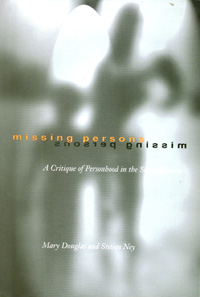 | Title: Missing persons: a critique of the social sciences Author: Douglas, Mary Published: University of California Press, 1998 Subjects: Sociology | Anthropology | Public Policy | Economics and Business Publisher's Description: The Western cultural consensus based on the ideas of free markets and individualism has led many social scientists to consider poverty as a personal experience, a deprivation of material things, and a failure of just distribution. Mary Douglas and Steven Ney find this dominant tradition of social thought about poverty and well-being to be full of contradictions. They argue that the root cause is the impoverished idea of the human person inherited through two centuries of intellectual history, and that two principles, the idea of the solipsist self and the idea of objectivity, cause most of the contradictions.Douglas and Ney state that Economic Man, from its semitechnical niche in eighteenth-century economic theory, has taken over the realms of psychology, consumption, public assistance, political science, and philosophy. They say that by distorting the statistical data presented for policy analysis, the ideas of the solipsist self and objectivity indeed often protect a political bias. The authors propose to correct this by revising the current model of the person. Taking cultural bias into account and giving full play to political dissent, they restore the "persons" who have been missing from the social science debates.Drawing from anthropology, economics, political science, and sociology, the authors set forth a fundamental critique of the social sciences. Their book will find a wide audience among social scientists and will also interest anyone engaged in current discussions of poverty.This book is a copublication with the Russell Sage Foundation. [brief] Similar Items |
| 4. | 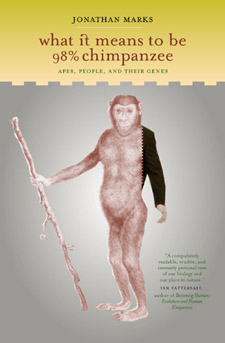 | Title: What it means to be 98% chimpanzee: apes, people, and their genes Author: Marks, Jonathan (Jonathan M.) 1955- Published: University of California Press, 2002 Subjects: EcologyEvolutionEnvironment | Evolution | Physical Anthropology | Sociology | Medicine | Mammalogy Publisher's Description: The overwhelming similarity of human and ape genes is one of the best-known facts of modern genetic sciencenm. But what does this similarity mean? Does it, as many have suggested, have profound implications for understanding human nature? Well-known molecular anthropologist Jonathan Marks uses the human-versus-ape controversy as a jumping-off point for a radical reassessment of a range of provocative issues--from the role of science in society to racism, animal rights, and cloning. Full of interesting facts, fascinating personalities, and vivid examples that capture times and places, this work explains and demystifies human genetic science--showing ultimately how it has always been subject to social and political influences and teaching us how to think critically about its modern findings. Marks presents the field of molecular anthropology--a synthesis of the holistic approach of anthropology with the reductive approach of molecular genetics--as a way of improving our understanding of the science of human evolution. As he explores the intellectual terrain of this field, he lays out its broad areas of interest with issues ranging from the differences between apes and humans to the biological and behavioral variations expressed in humans as a species. Marks confronts head-on the problems of racial classification in science. He describes current theories about race and uses work in primatology, comparative anatomy, and molecular anthropology to debunk them. He also sheds new light on the controversial Great Ape Project, the Human Genome Diversity Project, and much more. This iconoclastic, witty, and extremely readable book illuminates the deep background of human variation and asks us to reconsider the role of science in modern society. [brief] Similar Items |
| 5. |  | Title: The social edges of psychoanalysis Author: Smelser, Neil J Published: University of California Press, 1999 Subjects: Sociology | Social Theory | Psychology Publisher's Description: For several decades the writings of sociologist Neil J. Smelser have won him a vast and admiring audience across several disciplines. Best known for his work on social movements, economic sociology, and British social history, Smelser's psychoanalytic writings are less familiar to his readers. In fact, many people are completely unaware of Smelser's formal psychoanalytic training and ongoing counseling practice. With the publication of The Social Edges of Psychoanalysis , Smelser's thought-provoking essays on psychoanalytic concepts are finally brought together in one book.Psychoanalytic theory has had an ambivalent relationship with sociology, and these essays explore that ambivalence, providing arguments about how and why psychoanalytic approaches can deepen the sociological perspective. One of Smelser's main tenets is that human social behavior always contains both social-structural and social-psychological elements, and that psychoanalytic theory can bridge these two dimensions of human social life. Many of the issues Smelser addresses - including interdisciplinarity, the macro-micro link in research, masculinity and violence, and affirmative action - have generated considerable scholarly interest.This collection paves the way for further articulation of the relationship between sociology and psychoanalysis at a time when many sociologists are looking for interdisciplinary links in their work. Presented with clarity and grace, and free of the murkiness often found in both sociological and psychoanalytic writing, Smelser's new book will excite reflection and research on the less visible dynamics of social existence. [brief] Similar Items |
| 6. |  | Title: Justice and the human genome project Author: Murphy, Timothy F 1955- Published: University of California Press, 1994 Subjects: Philosophy | Ethics | Biology | Medicine Publisher's Description: The Human Genome Project is an expensive, ambitious, and controversial attempt to locate and map every one of the approximately 100,000 genes in the human body. If it works, and we are able, for instance, to identify markers for genetic diseases long before they develop, who will have the right to obtain such information? What will be the consequences for health care, health insurance, employability, and research priorities? And, more broadly, how will attitudes toward human differences be affected, morally and socially, by the setting of a genetic "standard"?The compatibility of individual rights and genetic fairness is challenged by the technological possibilities of the future, making it difficult to create an agenda for a "just genetics." Beginning with an account of the utopian dreams and authoritarian tendencies of historical eugenics movements, this book's nine essays probe the potential social uses and abuses of detailed genetic information. Lucid and wide-ranging, these contributions will provoke discussion among bioethicists, legal scholars, and policy makers. [brief] Similar Items |
| 7. | 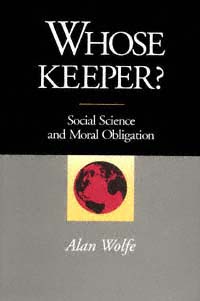 | Title: Whose keeper?: social science and moral obligation Author: Wolfe, Alan 1942- Published: University of California Press, 1991 Subjects: Sociology | Ethics | Politics | American Studies Similar Items |
| 8. | 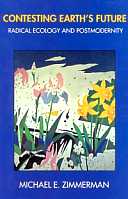 | Title: Contesting Earth's future: radical ecology and postmodernity Author: Zimmerman, Michael E 1946- Published: University of California Press, 1994 Subjects: Philosophy | Social and Political Thought | Natural History | Ecology | Sociology Publisher's Description: Radical ecology typically brings to mind media images of ecological activists standing before loggers' saws, staging anti-nuclear marches, and confronting polluters on the high seas. Yet for more than twenty years, the activities of organizations such as the Greens and Earth First! have been influenced by a diverse, less-publicized group of radical ecological philosophers. It is their work - the philosophical underpinnings of the radical ecological movement - that is the subject of Contesting Earth's Future .The book offers a much-needed, balanced appraisal of radical ecology's principles, goals, and limitations. Michael Zimmerman critically examines the movement's three major branches - deep ecology, social ecology, and ecofeminism. He also situates radical ecology within the complex cultural and political terrain of the late twentieth century, showing its relation to Martin Heidegger's anti-technological thought, 1960s counterculturalism, and contemporary theories of poststructuralism and postmodernity.An early and influential ecological thinker, Zimmerman is uniquely qualified to provide a broad overview of radical environmentalism and delineate its various schools of thought. He clearly describes their defining arguments and internecine disputes, among them the charge that deep ecology is an anti-modern, proto-fascist ideology. Reflecting both the movement's promise and its dangers, this book is essential reading for all those concerned with the worldwide ecological crisis. [brief] Similar Items |
| 9. |  | Title: International development and the social sciences: essays on the history and politics of knowledge Author: Cooper, Frederick 1947- Published: University of California Press, 1998 Subjects: History | Social Science | Postcolonial Studies | Anthropology | Economics and Business | Politics Publisher's Description: During the past fifty years, colonial empires around the world have collapsed and vast areas that were once known as "colonies" have become known as "less developed countries" or "the third world." The idea of development - and the relationship it implies between industrialized, affluent nations and poor, emerging nations - has become the key to a new conceptual framework. Development has also become a vast industry, involving billions of dollars and a worldwide community of experts. These essays - written by scholars in many fields - examine the production, transmission, and implementation of ideas about development within historical, political, and intellectual contexts, emphasizing the changing meanings of development over the past fifty years.The concept of development has come under attack in recent years both from those who see development as the imperialism of knowledge, imposing on the world a modernity that it does not necessarily want, and those who see development efforts as a distortion of the world market. These essays look beyond the polemics and focus on the diverse, contested, and changing meanings of development among social movements, national governments, international agencies, foundations, and scholars. [brief] Similar Items |
| 10. | 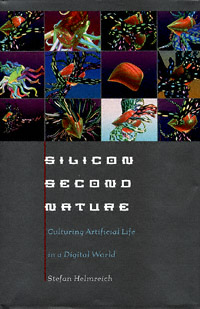 | Title: Silicon second nature: culturing artificial life in a digital world Author: Helmreich, Stefan 1966- Published: University of California Press, 1998 Subjects: Science | Computer Science | Biology | Technology and Society | Social Theory | Cultural Anthropology | California and the West Publisher's Description: Silicon Second Nature takes us on an expedition into an extraordinary world where nature is made of bits and bytes and life is born from sequences of zeroes and ones. Artificial Life is the brainchild of scientists who view self-replicating computer programs - such as computer viruses - as new forms of life. Anthropologist Stefan Helmreich's look at the social and simulated worlds of Artificial Life - primarily at the Santa Fe Institute, a well-known center for studies in the sciences of complexity - introduces readers to the people and programs connected with this unusual hybrid of computer science and biology.When biology becomes an information science, when DNA is downloaded into virtual reality, new ways of imagining "life" become possible. Through detailed dissections of the artifacts of Artifical Life, Helmreich explores how these novel visions of life are recombining with the most traditional tales told by Western culture. Because Artificial Life scientists tend to see themselves as masculine gods of their cyberspace creations, as digital Darwins exploring frontiers filled with primitive creatures, their programs reflect prevalent representations of gender, kinship, and race, and repeat origin stories most familiar from mythical and religious narratives.But Artificial Life does not, Helmreich says, simply reproduce old stories in new software. Much like contemporary activities of cloning, cryonics, and transgenics, the practice of simulating and synthesizing life in silico challenges and multiplies the very definition of vitality. Are these models, as some would claim, actually another form of the real thing? Silicon Second Nature takes Artifical Life as a symptom and source of our mutating visions of life itself. [brief] Similar Items |
| 11. |  | Title: Spacefaring: the human dimension Author: Harrison, Albert A Published: University of California Press, 2001 Subjects: Science | Technology and Society | Psychology Publisher's Description: The stars have always called us, but only for the past forty years or so have we been able to respond by traveling in space. This book explores the human side of spaceflight: why people are willing to brave danger and hardship to go into space; how human culture has shaped past and present missions; and the effects of space travel on health and well-being. A comprehensive and authoritative treatment of its subject, this book combines statistical studies, rich case histories, and gripping anecdotal detail as it investigates the phenomenon of humans in space - from the earliest spaceflights to the missions of tomorrow. Drawing from a strong research base in the behavioral sciences, Harrison covers such topics as habitability, crew selection and training, coping with stress, group dynamics, accidents, and more. In addition to taking a close look at spacefarers themselves, Spacefaring reviews the broad organizational and political contexts that shape human progress toward the heavens. With the ongoing construction of the International Space Station, the human journey to the stars continues, and this book will surely help guide the way. [brief] Similar Items |
| 12. |  | Title: Globalization and human rights Author: Brysk, Alison 1960- Published: University of California Press, 2002 Subjects: Politics | International Relations Publisher's Description: In this landmark volume, Alison Brysk has assembled an impressive array of scholars to address new questions about globalization and human rights. Is globalization generating both problems and opportunities? Are new problems replacing or intensifying state repression? How effective are new forms of human rights accountability? These essays include theoretical analyses by Richard Falk, Jack Donnelly, and James Rosenau. Chapters on sex tourism, international markets, and communications technology bring new perspectives to emerging issues. The authors investigate places such as the Dominican Republic, Nigeria, and the Philippines. The contemporary world is defined by globalization. While global human rights standards and institutions have been established, assaults on human dignity continue. These essays identify the new challenges to be faced, and suggest new ways to remedy the costs of globalization. [brief] Similar Items |
| 13. |  | Title: Yorick's world: science and the knowing subject Author: Caws, Peter Published: University of California Press, 1993 Subjects: Philosophy | History and Philosophy of Science Publisher's Description: Peter Caws provides a fresh and often iconoclastic treatment of some of the most vexing problems in the philosophy of science: explanation, induction, causality, evolution, discovery, artificial intelligence, and the social implications of technological rationality.Caws's work has been shaped equally by the insights of Continental philosophy and a concern with scientific practice. In these twenty-eight essays spanning more than a quarter of a century, he ranges from discussions of the work of French philosopher Gaston Bachelard, to relations between science and surrealism, to the concept of intentionality, to the limits of quantitative description. A lively mix of history, theory, speculation, and analysis, Yorick's World presents a vision of science that includes human history and social life. It will interest professional philosophers and scientists, and at the same time its directness will make it readily accessible to nontechnical readers. [brief] Similar Items |
| 14. |  | Title: Inference, explanation, and other frustrations: essays in the philosophy of science Author: Earman, John Published: University of California Press, 1992 Subjects: Philosophy | History and Philosophy of Science Publisher's Description: These provocative essays by leading philosophers of science exemplify and illuminate the contemporary uncertainty and excitement in this changing field. The papers are rich in new perspectives, and their far-reaching criticisms challenge arguments long prevalent in classic philosophical problems of induction, empiricism, and realism. By turns empirical or analytic, historical or programmatic, confessional or argumentative, the authors' arguments both describe and demonstrate the fact that philosophy of science is in a ferment more intense than at any time since the heyday of logical positivism seventy years ago. [brief] Similar Items |
| 15. |  | Title: Genetic nature/culture: anthropology and science beyond the two-culture divide Author: Goodman, Alan H Published: University of California Press, 2003 Subjects: Anthropology | Biology | Sociology Publisher's Description: The so-called science wars pit science against culture, and nowhere is the struggle more contentious - or more fraught with paradox - than in the burgeoning realm of genetics. A constructive response, and a welcome intervention, this volume brings together biological and cultural anthropologists to conduct an interdisciplinary dialogue that provokes and instructs even as it bridges the science/culture divide. Individual essays address issues raised by the science, politics, and history of race, evolution, and identity; genetically modified organisms and genetic diseases; gene work and ethics; and the boundary between humans and animals. The result is an entree to the complicated nexus of questions prompted by the power and importance of genetics and genetic thinking, and the dynamic connections linking culture, biology, nature, and technoscience. The volume offers critical perspectives on science and culture, with contributions that span disciplinary divisions and arguments grounded in both biological perspectives and cultural analysis. An invaluable resource and a provocative introduction to new research and thinking on the uses and study of genetics, Genetic Nature/Culture is a model of fruitful dialogue, presenting the quandaries faced by scholars on both sides of the two-cultures debate. [brief] Similar Items |
| 16. | 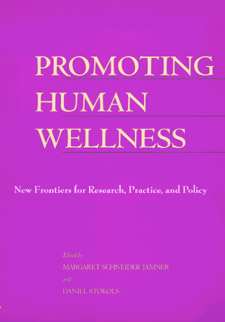 | Title: Promoting human wellness: new frontiers for research, practice, and policy Author: Jamner, Margaret Schneider Published: University of California Press, 2001 Subjects: Medicine | Public Policy | Anthropology | Aging | Education Publisher's Description: This book is a state-of-the-art educational resource on the latest research and public-policy developments in the fields of wellness promotion and disease prevention. Based on award-winning lectures by University of California faculty on nine campuses as part of the Wellness Lectures Program jointly funded by The California Wellness Foundation, Health Net, and the University of California, the volume aims to widen the scope of health care research and policy to promote wellness rather than focus on illness and disease, and to incorporate proactive, interdisciplinary approaches to health care. The volume also contains chapters by distinguished scholars inthe fields of wellness promotion and disease prevention. Many of these articles fall outside the scope of what we conventionally call health promotion, bringing new perspectives to research and policy possibilities. Promoting Human Wellness is organized around core themes such as the importance of disease prevention programs that address multiple health risks, the link between poverty and minority status and disease susceptibility, and the challenge of evaluating health benefits and cost-effectiveness. The articles discuss such timely issues as genetic determinism as a paradigm in wellness promotion, adolescent health promotion and teen pregnancy prevention strategies, racial differences in cancer epidemiology, the California smokers' helpline, strategies for reducing youth violence, HIV/AIDS prevention, domestic violence education and prevention srategies, and the future of women's health research. Presented within the framework of social ecology, several of the chapters in this volume address new ideas and approaches in the wellness field that are only now beginning to be understood such as the social construction of variables including race, class, and gender. Promoting Human Wellness will be essential reading for health practitioners, policymakers, and others seeking to expand the ways we define and achieve health. Keywords: Public health, community health, medicine, nursing, social welfare, health education, health psychology, social ecology, public policy, aging, health promotion. [brief] Similar Items |
| 17. | 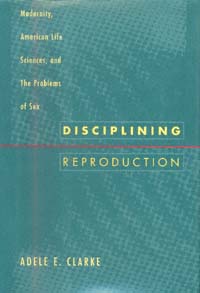 | Title: Disciplining reproduction: modernity, American life sciences, and "the problems of sex" Author: Clarke, Adele Published: University of California Press, 1998 Subjects: Sociology | Medical Anthropology | Medicine | American Studies | Gender Studies Publisher's Description: Reproductive issues from sex and contraception to abortion and cloning have been controversial for centuries, and scientists who attempted to turn the study of reproduction into a discipline faced an uphill struggle. Adele Clarke's engrossing story of the search for reproductive knowledge across the twentieth century is colorful and fraught with conflict.Modern scientific study of reproduction, human and animal, began in the United States in an overlapping triad of fields: biology, medicine, and agriculture. Clarke traces the complicated paths through which physiological approaches to reproduction led to endocrinological approaches, creating along the way new technoscientific products from contraceptives to hormone therapies to new modes of assisted conception - for both humans and animals. She focuses on the changing relations and often uneasy collaborations among scientists and the key social worlds most interested in their work - major philanthropists and a wide array of feminist and medical birth control and eugenics advocates - and recounts vividly how the reproductive sciences slowly acquired standing.By the 1960s, reproduction was disciplined, and the young and contested scientific enterprise proved remarkably successful at attracting private funding and support. But the controversies continue as women - the targeted consumers - create their own reproductive agendas around the world. Elucidating the deep cultural tensions that have permeated reproductive topics historically and in the present, Disciplining Reproduction gets to the heart of the twentieth century's drive to rationalize reproduction, human and nonhuman, in order to control life itself. [brief] Similar Items |
| 18. |  | Title: Human rights and reform: changing the face of North African politics Author: Waltz, Susan Eileen Published: University of California Press, 1995 Subjects: Politics | History | Middle Eastern Studies | Middle Eastern History | African History | African Studies Publisher's Description: Independence from colonial rule did not usher in the halcyon days many North Africans had hoped for, as the new governments in Morocco, Tunisia, and Algeria soon came to rely on repression to reinforce and maintain power. In response to widespread human rights abuses, individuals across the Maghrib began to form groups in the late 1970s to challenge the political practices and structures in the region, and over time these independent human rights organizations became prominent political actors. The activists behind them are neither saints nor revolutionaries, but political reformers intent on changing political patterns that have impeded democratization.This study, the first systematic comparative analysis of North African politics in more than a decade, explores the ability of society, including Islamist forces, to challenge the powers of states. Locating Maghribi polities within their cultural and historical contexts, Waltz traces state-society relations in the contemporary period. Even as Algeria totters at the brink of civil war and security concerns rise across the region, the human rights groups Susan Waltz examines implicitly challenge the authoritarian basis of political governance. Their efforts have not led to the democratic transition many had hoped, but human rights have become a crucial new element of North African political discourse. [brief] Similar Items |
| 19. | 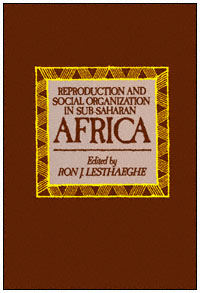 | Title: Reproduction and social organization in Sub-Saharan Africa Author: Lesthaeghe, Ron J 1945- Published: University of California Press, 1989 Subjects: African Studies | Cultural Anthropology | Medical Anthropology Publisher's Description: Unlike most Asian and Latin American countries, sub-Saharan Africa has seen both an increase in population growth rates and a weakening of traditional patterns of child-spacing since the 1960s. It is tempting to conclude that sub-Saharan countries have simply not reached adequate levels of income, education, and urbanization for a fertility decline to occur. This book argues, however, that such a socioeconomic threshold hypothesis will not provide an adequate basis for comparison. These authors take the view that any reproductive regime is also anchored to a broader pattern of social organization, including the prevailing modes of production, rules of exchange, patterns of religious systems, kinship structure, division of labor, and gender roles. They link the characteristic features of the African reproductive regime with regard to nuptiality, polygyny, breastfeeding, postpartum abstinence, sterility, and child-fostering to other specifically African characteristics of social organization and culture. Substantial attention is paid to the heterogeneity that prevails among sub-Saharan societies and considerable use is made, therefore, of interethnic comparisons. As a result the book goes considerably beyond mere demographic description and builds bridges between demography and anthropology or sociology. [brief] Similar Items |
| 20. |  | Title: Gaining ground: tailoring social programs to American values Author: Lockhart, Charles 1944- Published: University of California Press, 1989 Subjects: Politics Publisher's Description: Social policy questions present Americans with a cruel dilemma. Most of us will confront hazards, such as illness or aging, against which private personal resources are an inadequate defense. With this in mind, it becomes clear that conditions of our contemporary society make some kinds of public social programs necessary. Yet, many Americans find difficulty with state-sponsored public programs which, though aimed at providing a safety net for our most vulnerable citizens, seem to run against such American values as individualism and self-reliance. In Gaining Ground , Charles Lockhart suggests a way to reconcile this dilemma by tailoring public social programs to prominent values of American political culture.Using the social security system as a model, Lockhart suggests that all social policy programs should draw upon five basic principles. First, they ought - as much as possible - to be based on reciprocity ; those who contribute to the social product may in turn draw on that product when social hazards confront them. Second, social program assistance should generally be aimed at supplementing recipient households' efforts at self-support. Third, programs should be inclusive ; benefits should be accessible to everyone within a particular program. Fourth, we should rely insofar as possible on social insurance for meeting the needs of those confronting various social hazards. And fifth, social merging programs incorporating features similar to those of social insurance are preferable to public assistance efforts. Lockhart uses these principles to develop an innovative plan for social policy that he calls an investments approach. Gaining Ground provides an important contribution to the discussion about the dynamics and future of social policy and should elicit a range of responses from scholars and policymakers alike. [brief] Similar Items |